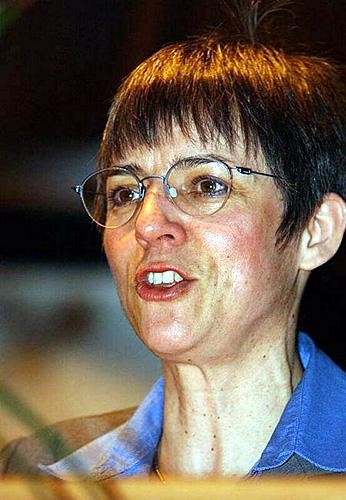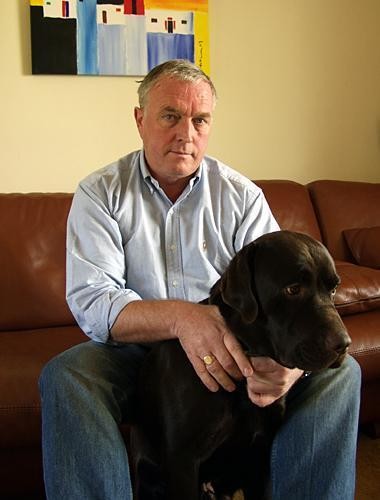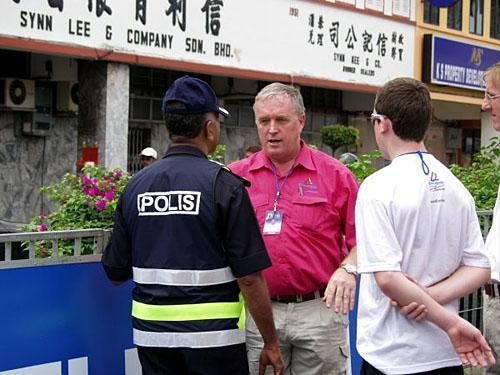Next in Line? - Part II
In Part I of this interview, Pat McQuaid expressed his faith in the practices and processes of the...



An interview with Pat McQuaid, August 17, 2005
Next in Line? - Part II
In Part I of this interview, Pat McQuaid expressed his faith in the practices and processes of the UCI, saying that cycling's governing body has acted appropriately and transparently in the leadup to UCI presidential elections. In Part II of Shane Stokes' interview, McQuaid discusses further election issues and looks to the future, in particular the direction the UCI will take in relation to the ProTour.
Cyclingnews: In Sylvia Schenk's interview, she mentions that the Asian candidate, Mr Dato Seri Darshan Singh, has complained delegates have been changed recently. Is that true, and if so, why were they changed?
Pat McQuaid: Well, that is something for the Asian Confederation and the Asian Confederation President to respond to, rather than me. Again, you have a lawyer who has lost the presidency of the ACC, he has lost his place on the board of the UCI, so he has decided to put forward a candidacy for presidency. He will try by whatever means he can to ensure he gets a good run at it. Again, you have somebody there with nothing to lose. So he can make all sorts of accusations.
CN: When is Hein Verbruggen due to step down from his role as President?
PMcQ: Our congress is on the 23rd of September, in Madrid. That is when the election takes place.
The latest race content, interviews, features, reviews and expert buying guides, direct to your inbox!
CN: So what will his involvement be afterwards? I have heard some suggestions that a new role of Chairman will be created and he will take this up?
PMcQ: No...no, no, the new President will be Chairman of the board.
CN: So will Hein Verbruggen remain within the UCI, or retire completely?
PMcQ: He will remain as part of the UCI. He is too valuable to the UCI to stop completely, because he is too highly respected in the international sporting world. The new president will certainly need his contacts in the coming years in order to build and develop and continue the various positions which the UCI has in the international sporting arena.
CN: Will he be separate to the management committee and its decisions, or will he be part of it?
PMcQ: That is something that we will just have to wait and see. We have decided nothing yet. Not only do we get a new president on September 23, but we also get a new management committee.
CN: Hein Verbruggen has been backing your campaign. Can you reassure people that you will be independent to Hein Verbruggen - that he won't have a part to play in your decisions should you become president?
PMcQ: At the end of the day, Hein Verbruggen has supported me because the board of the UCI has done so. I was nominated...and this needs to be clarified - I was nominated by the European Cycling Confederation. I wasn't selected by Hein Verbruggen. I was nominated by the European Cycling Confederation at a board meeting. They had a meeting of their own at which they discussed the potential vacancy of the presidency of the UCI and they decided that they would nominate me. Vladimir Holecek then nominated me in Hamilton 2003 and the board of the UCI accepted that nomination. So the board of the UCI supported me and has continued to support me since then for the presidency. And they will continue to do so. Not just Hein Verbruggen, but the rest of the board as well.
So, if the election goes well in September and I am elected, I will be the president and lead the UCI. Again, I will have a board around me and it's the board's decisions which are important. It is not necessarily the president who decides everything, it is the board which decides everything. It is a democracy; we sit and discuss the issues and then the board takes the decision and we go from there.
CN: Should everything go to plan for you and you are elected on September 23, what would your goals be, both short-term and long-term?
PMcQ: The immediate goals will be to gel a new board together. And also, to look at the various disciplines throughout the sport and make sure each one of them is going forward. Cycling has gone through a lot of reforms... most of our disciplines have been going through major reforms over the past couple of years. So now we need a period of consolidation. We need to look at each of the disciplines and look at the development of that discipline.
At the moment, I am here at the world junior championships, track and road. We took the decision three years ago that we would take the junior road championships away from the senior Road Championships in September and bring them together with the junior track Championships, in order to encourage more crossover from road to track. The idea was to get more road riders doing the track. This is the first year that it has been run jointly and it seems that there are over 100 entries more in the track championship than there were in Los Angeles last year. Now we need to continue the study to ensure that there is crossover, that the riders are riding both road and track here. These are things that we need to look at in the short term, to ensure that we are going in the right direction with the various disciplines. And the same applies with other disciplines, too...we have BMX coming in as a new sport for the Olympics, so we need to look at the development of BMX worldwide.
In the long-term, it is the globalisation of cycling which we will be very interested in. I'm convinced from my experience travelling outside Europe that there is massive potential for cycling in places like the Far East and South America and North America, places like that. And that is what I would like to be concentrating on. There is massive potential in the Eastern European countries, and so forth. So, in the long-term, I would like to ensure that all develops.
CN: Turning to the ProTour, things have been far from smooth this year. There have been recent suggestions that the Grand Tours plus the other related races may not be part of the series next season. Can you give me an update on that situation?
PMcQ: Well, the update is that the Grand Tour organisers met with President Verbruggen early last week, and we felt that there was an agreement possible. Then, three days later, they turned around with a whole lot of other conditions, which they weren't prepared to budge on. They put out a press release stating what their position was and they waited then for the response of the teams, because they knew what the UCI's position was on the points that were brought forward.
But the teams refused to accept the conditions as laid down by the Grand Tours. So, from that point of view, it looks like they are putting themselves out on a wing and so the UCI will then have to act and create a calendar for them and their events, separate to the ProTour.
CN: If there is a situation where the Grand Tours and related races such as Paris-Roubaix are excluded, can the ProTour survive without those races?
PMcQ: It can do, yes. It certainly could survive, there are other races wanting to come into the ProTour and it could open up things for them. At the end of the day, the other races will survive as well. The teams will then attend by choice those they wish to ride.
It is an unfortunate situation but one which has been brought about by virtual complete intransigence on the part of the three Tours, in particular the Tour de France.
CN: So can you envisage a situation where there could be two rival series set up, the ProTour and one run by the Grand Tour organisers?
PMcQ: No, not at all, no. I wouldn't envisage that at all, because the teams are in complete solidarity with the UCI on this one. I couldn't see how the Grand Tours could have races if they didn't have teams to ride them. You see, the power game is changing from what was in the past. In the past you had the UCI and the Tour de France, or the Grand Tours, and the power was jointly shared out between the two of them.
Now, the teams have come in, and in recent years they have got stronger and stronger. They formed the AIGCP, they formed their own association and they started looking for conditions to be as they wanted to be. As a result the power structure is changing. The teams now have a much bigger say, naturally enough, in how the races are run and how conditions are laid out for teams, etc. They are a unified group and they work together. They have seen the benefits of the ProTour, as indeed has most of the sporting public, the cycling public. They have experienced them [the benefits] because out of the top 20 teams in the ProTour, 15 of them have four-year contracts. A couple of years ago, you may have got one or two teams with four-year contracts with sponsors.
As an example, look at Theo de Rooy at Rabobank. He has got 75 staff on that team. He is responsible for 75 salaries, and included in a lot of those salaries would be mortgages, etc. So the fact that teams can have four to five-year contracts put a lot more stability into the whole professional cycling scene. And that is only part of what the ProTour has brought into cycling. So there are benefits not just for the sporting public, in terms of the racing that they are seeing, but also from the stability of the teams.
CN: Do you think it is fair to say that non-ProTour events have suffered this year, though...there have been some races with very small fields. What is the solution for those events?
PMcQ: Well, some races may have suffered a little bit. There is a natural process going on anyway, and some people will argue that there are too many races on the calendar as it is. So there is a natural process happening which has been going on for many years in several parts of Europe, with races coming and races going. I don't think a lot of this is necessarily as a result of the ProTour, even if some of the organisers would like to blame the ProTour. But the unfortunate situation is that with the current scenario as we have it, with the three Tours and so forth not working in unison with the UCI, it is very difficult to improve the situation. You really need everybody around the table singing off the same hymn sheet and working together to improve the total situation. When the ProTour was set up, it wasn't just for the sake of the ProTour, it was for the world calendar as well. And the continental calendars were all part of the major reform that went on.
The continental calendars could do with some tweaking to improve on, but that is something which we in the Road Commission will address. There is a meeting of the Road Commission coming up this week, and there is also a meeting of the Calendar Working Group of the Road Commission in, I think, two weeks time. As those meetings we will be discussing the issues in relation to the races that are suffering, in terms of moving races around on the calendar and giving them a better slot so that they are not clashing with so many ProTour races. That should give them a better quality of field. But we need everybody working together, really, for that situation to completely evolve.
CN: Is there an issue for ProTour events, too, in that quite a few of them overlap?
PMcQ: No, there wouldn't be an issue in that. Again, part of the investment of the ProTour teams is to increase the number of riders. The teams have got so many that is quite easy for them to field two squads at the one time. So that's not an issue at all, really.
CN: Cycling is increasingly globalised. For example, Australian riders are very successful, and so too American riders. Do you think in the near future that a non-European country or countries will host a ProTour event?
PMcQ: I think it could be a possibility, yeah. You have to look at the logistics of hosting a ProTour event under the conditions that are currently there for ProTour events, though. I know there is interest in places like Australia, Malaysia and the USA in hosting a ProTour event. It could come around quicker than we think, especially if the current situation [with the Grand Tour organisers] evolves as it may do.
But the whole issue with the conditions makes it very difficult, in terms of the 20 teams and all the personnel, etc, for a non-European organiser to put on such an event. The reason for this is because you're looking at a lot of very expensive airfares to wherever it may be. In Europe, they travel by car or by plane over short distances, but when you start exporting the whole ProTour teams to places like the USA or places like Australia, then you're talking about a lot of logistics and a lot of heavy expense. And, as well as that, the riders are not robotic; you have got to allow them time to rest and recover from races. When you start adding jet lag and factors like that into the equation, it makes it very complicated.
But you are correct in saying that cycling is becoming more globalised, and my idea for the UCI would be that cycling in the coming years will become even more globalised. The plan with the development of the continental calendars is to do so. We are already seeing evidence of success in that area. There is no doubt that within the next five to ten years, the sport will become more globalised. And, from that, who knows what may happen?
CN: You mentioned sticking points between the Grand Tour organisers and the UCI. Can you underline the main areas of discontent?
PMcQ: Well, the main areas seem to be the number of wildcards that the Grand Tours are requesting. They want to diminish the number of teams in the ProTour. They just want more control and more say in how they want the fields to be made up. But what they tend to forget is that the UCI is the regulatory authority for cycling, that the UCI makes the rules and regulations. They don't seem to want to accept that.
CN: But is it true that the Grand Tour organisers have to pay a larger amount to teams under the new ProTour structure - that they are losing out financially, in that respect?
PMcQ: I don't think that they necessarily are. I think it was fact of life, something that was happening before the ProTour came along, that the teams were seeking increased funding and expenses from the Grand Tour organisers. I don't think the ProTour has necessarily changed that dramatically. So, from the point of view of making money or losing money, I don't think it is costing them hugely. They have 20 teams in the race, and whether they are ProTour teams or wildcards, they still have to pay for the expenses of those teams in the race. I don't think that is an issue.
CN: Looking back to this year's Giro, there were problems with the teams on this subject. I seem to remember that the overall amount that the organisers had to commit was higher at this time around?
PMcQ: No, I don't think that is quite the case. I think what they [the organisers] tried to do was to reduce the money from previous years and the teams wouldn't accept that.
CN: What about television rights?
PMcQ: That is not an issue! Television rights are not an issue. The UCI have never claimed that they wish to take over or get involved in television rights. Television rights are the prerogative and the ownership of the actual organisers of the event, and that is something that wasn't going to change. It is not going to change. We have no interest in getting into that area at all.
